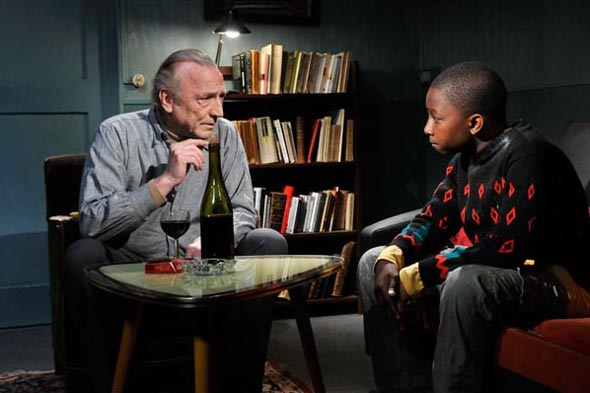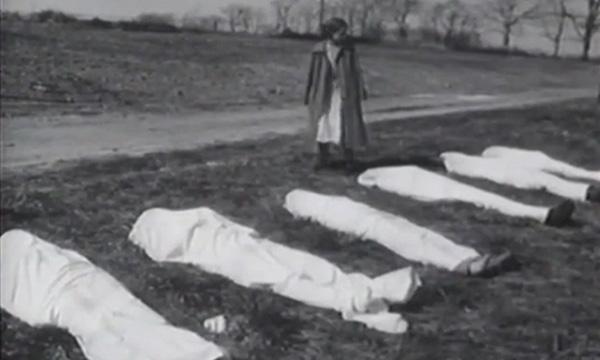Nick Broomfield appeared on The Bat Segundo Show #413. He is most recently the co-director of Sarah Palin: You Betcha.
Listen: Play in new window | Download
Condition of Mr. Segundo: Wondering if he has gone rogue or rouge.
Guest: Nick Broomfield
Subjects Discussed: Being attracted to conservative politicians with big hair, Christopher Hitchens’s sexual fantasies about Margaret Thatcher, Frederick Wiseman and Errol Morris, contending with publicists and press agents, Joe McGinniss’s The Rogue, Levi Johnston and Tank Jones, filming Daryl Gates accepting an interview fee on camera, the ethics of paying interview subjects, Broomfield’s amateurist aesthetic, the faux professionalism of film crews, Broomfield filming himself on the phone, Broomfield’s tendency to gravitate towards ad hominem, whether the possibility of Sarah Palin becoming President is a serious question, John Bitney, Steve Schmidt, campaign management of Palin, Broomfield doing less documentaries, the Kickstarter campaign for Sarah Palin: You Betcha, flipping between documentaries and narratives, wearing red flannel in Wasilla, JC McCavitt, the influence of Palin and the evangelical right in Wasilla, whether or not Wasilla reflects America, whether Broomfield is motivated by vengeance or retaliation, the chewing gum photo montage, balancing the visual details and the facts, collaborating with Joan Churchill, why Broomfield put himself in front of the camera after Lily Tomlin, claims of Lily Tomlin’s insecurity, the difficulty of filming Tomlin, why the construction of a documentary creates a more inclusive one, the dangers of moral labels, why people should trust Nick Broomfield, moral paralysis, subjective truth borne from a personal quest, embarrassing public questioning, Broomfield’s view of restraint as a weakness, hedge funds, getting investors to sign on for a Broomfield movie, working with non-actors, and the ever-shifting Broomfield paradigm.
EXCERPT FROM SHOW:
Correspondent: Going back to Margaret Thatcher [Tracking Down Maggie], it seems to me that you have an especial interest in conservative politicians with very interesting hair-dos. What’s up with this particular commonality? I sense also a formalistic commonality as well with the chase for Maggie and the chase for Sarah here. What of this?
Broomfield: Well, in fact, I never thought of the similarity of the hair-dos. But now that you’ve pointed it out, it’s quite extraordinary.
Correspondent: Are you a man who likes big hair? You’re a Clintonian man?
Broomfield: I’m actually not a particularly big hair man. But when I was doing the Margaret Thatcher film, one of the people I interviewed was Christopher Hitchens.
Correspondent: Yes.
Broomfield: Who had a lot of almost sexual fantasies about Margaret Thatcher, which I hasten to add I never shared. But I noticed that a lot of people also have the same feelings about Sarah Palin.
Correspondent: Yes.
Broomfield: And, again, I’ve never succumbed to those kinds of thoughts with her. But I think that both women captured the imagination of a large part of the population. Probably also because they were women and they had a determination and a charm that was unexpected and was refreshing in its own way.
Correspondent: Yeah. Not attracted to Sarah sexually. But I also think to Fetishes and also to Heidi Fleiss; Hollywood Madam.
Broomfield: Right.
Correspondent: It seems that there is also some sexual quality sometimes to some of your subjects. Especially women. Why do you think this is?
Broomfield: Well, I mean, I think as any full-blooded male once interested — I would apply it more to films like, yeah, Fetishes, Heidi Fleiss. I did a film, Chicken Ranch, in a legalized brothel in Nevada. Even someone like Aileen Wuornos was very interesting along those lines. Sexual lines. It’s funny. Just last week, I saw Fred Wiseman in Toronto. He’s just made a film. The Crazy Horse. A strip club. And before that, he did the ballet film. And I said, “Fred, do I get the sense of some kind of Fräulein in your work.” And he said, “I’d like to see what you’re doing when you’re 81 years old.”
Correspondent: Errol Morris’s Tabloid as well. While we’re on the subject.
Broomfield: Oh really?
Correspondent: Yeah, there you go.
Broomfield: What’s he just done?
Correspondent: He did Tabloid on the sex scandal. 1970s. So there we go.
Broomfield: There we go.
Correspondent: All you documentary filmmakers are turning into dirty old men.
Broomfield: Exactly. Exactly. Just give me a few more years and I’ll be completely there.
Correspondent: To get on a serious subject, since you had experienced difficulties in both Tracking Down Maggie and Heidi Fleiss: Hollywood Madam when dealing with press agents and publicists, you had to know going into this one that you were probably not going to get a sitdown interview with Sarah Palin.
Broomfield: Well, I think that I always had the belief that I would get one probably. And it was only after we’d been there for about ten weeks — just before Christmas — that I really realized with that final phone call with Chuck Heath, the father, that I wasn’t going to get one. I don’t know that one would necessarily learn something devastatingly original with a sitdown interview with her. Because she’s done many interviews and nothing very revealing has come out. Generally, she’s revealing by omission. Which is: she doesn’t know something or she mispronounces a word or she is factually inaccurate or she gets things all confused. So she’s very revealing. Generally about lack of knowledge. She’s very unrevealing generally about herself and her upbringing and even her beliefs. I think she’s very guarded. For somebody who studied media at university, she is completely distrusting of the media and has more control probably over what she says and does than anybody. I mean, the only interview she does is with FOX Television, who she’s employed by. And obviously Facebook and Twitter. But I did think that as we were resident in Wasilla that maybe we would get a down moment with her that would at least be revealing of her — thank you (to barista) — of her family and her friends and the way she saw life around her or as part of the evangelical community. Which is really what Wasilla is.
Correspondent: Well, this is interesting because Joe McGinniss also has a book called The Rogue. And he managed to get more childhood friends to talk — anonymously in that book — and you had to go all the way to way to Alexandria to find someone who would talk with you. I’m curious…
Broomfield: Well, my sources were not talking anonymously. They were talking on camera. And I can back up all my various claims in the film. Whereas I think one of the problems in quoting undisclosed sources is that you cannot back up your claims. And you obviously can’t do that in a film.
Correspondent: I was curious. While we’re on the subject of interviews, Heidi Fleiss: Hollywood Madam has the famous moment where you’re showing Daryl Gates accept the cash.
Broomfield: Right.
Correspondent: In this, you have one moment where you’re talking to Levi Johnston’s manager, Tank Jones, and you’re negotiating trying to interview him for $500. And I’m curious about this. Is this kind of thing ethical? I mean, why would it be ethical? And I’m wondering, when you do in fact pay someone for an interview, do you feel an obligation to feature that on screen? Has this always been the case for you? Have you paid other people?
Broomfield: What I think was interesting is that people like Levi Johnston basically live off — I introduce that segment in the film, saying that there’s an industry that’s grown up around Sarah Palin and people live from that industry. So that was an illustration of Levi Johnston basically — I mean, I think they were asking $20,000. So I think my derisory offer of $500 was more of a joke than anything else. But I think it’s very relevant to point out that there is a great deal of money in tabloid journalism and that people are paid to make contributions. I mean, I didn’t pay anyone in this film. But there have been other films, which you quite rightly pointed out. Like, for example, the Heidi Fleiss film, everybody expected to be paid.
Correspondent: Everybody in Heidi Fleiss pretty much got paid? Ms. Sellers and the like?
Broomfield: They all expected to be paid. I don’t know if they all got paid. But yes. And I think I make a big point of that in the film. I comment on how much money various people wanted. Like DarylGates. I think he wanted $2,000. $1,500 to take part.
Correspondent: But when you introduce money into the equation, doesn’t this affect what you’re going to be getting from your documentary subjects?
Broomfield: Well, I’m making a film about what is. And we live in a world that’s very commercial and a world that has to do with money. And as a documentary filmmaker, you’re reporting on that world. So if everyone wants money in that world, you report on that fact. And of course, that makes a difference. Yes.
Correspondent: What about this amateurist aesthetic that is often in your films? I think of the tape running out in Biggie and Tupac.
Broomfield: Right.
Correspondent: And in this [Sarah Palin: You Betcha], your efforts to try and cross an iced lake or to try and negotiate ice in numerous ways. Or the hat trick in, of course, The Leader[, His Driver and the Driver’s Wife]. And all that.
Broomfield: Right.
Correspondent: There’s a certain…
Broomfield: You’ve certainly done your homework here.
Correspondent: Well, I’m curious about why this exists. Are these deliberate moves on your part to either win over your subjects or win over the audience with a more amateurist approach that’s calculated? Or are these just mess ups on your part?
Broomfield: Well, I would argue that there’s sort of a faux professional approach with a lot of film crews. You know, when they climb back in the car and drive on to the next location, I’m sure they’re a whole lot of fun. And they crack a whole lot of jokes that are not in the film. But when they get the cameras out, they get the clipboards out, and they became these serious professionals. Which I think is a load of bullshit. I think it’s much better to reveal what it’s really like to be doing that film or what you really think or what the humor is, you know? Rather than having this — you know. I remember when I was working for television. I was working with a presenter. And the presenter was actually a very funny guy. And I remember we were making a film in a monastery. And he would get into all these arguments with the monks about whether God existed or how many angels he could get on a pin and all those classic debates. And he would always lose the arguments. Because the monks and the abbot and so on, that’s all they did. And they studied all the books. And they were really up on their theology and logic. And when I showed the film to the TV company, they were horrified. Because they said a professional reporter does not lose his way. Does not stumble over words. Doesn’t turn to the camera and say, “I’m stuck.” But of course, they do. And I think by including those kinds of things, you make a much more accurate portrait than if you leave them out. I think there’s a sort of faux professionalism that we’re surrounded by that is completely inaccurate.
Correspondent: But doesn’t your persona, your schtick, sometimes get in the way of the very subjects that you’re photographing. I mean, every time you make a telephone call in your movies, you’re always in a car.
Broomfield: Right.
Correspondent: And I’m wondering why you feel the need to film that as well. It’s almost as if you’re counting on the subject to say no.
Broomfield: Well, what…wha…I mean, I don’t really understand the point. I don’t know whether you’re saying that the phone calls are irrelevant or the fact that I’m in a car is irrelevant.
Correspondent: I’m trying to point out that you’re really trying to show yourself more than anything else.
The Bat Segundo Show #413: Nick Broomfield (Download MP3)




